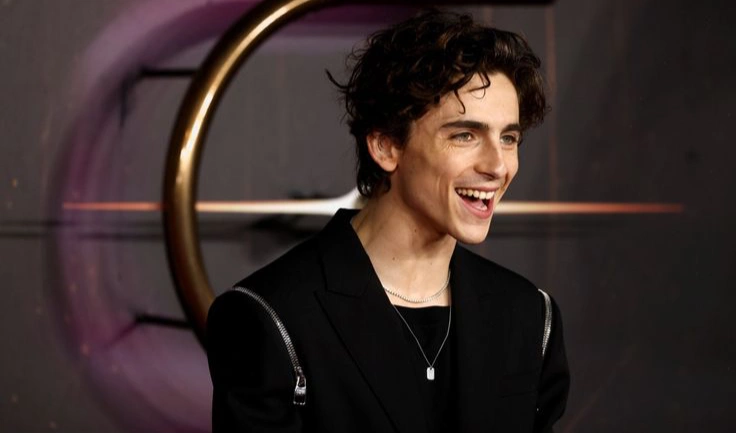Timothée Chalamet – “Dune: Messiah” (2025)
After the resounding success of the first two films, “Dune: Messiah” becomes the third chapter in Denis Villeneuve’s epic saga based on Frank Herbert’s novels. Timothée Chalamet returns as Paul Atreides — now a messianic emperor torn between personal loss and the fate of the galaxy. Set for release on December 18, 2025, the film is already hailed as the trilogy’s most emotionally complex installment.
Set several years after Paul’s victory over the Harkonnens, the film follows a man who, despite being revered as a savior, is haunted by visions of tyranny and destruction. Chalamet delivers a profound transformation: Paul is no longer a youthful avenger, but a reluctant ruler burdened by power. New characters emerge — Alia (Florence Pugh), the mysterious Scytale, and the escalating political games of the Bene Gesserit.
Visually, the film expands even further: desert warfare gives way to sacred temples, prophetic dreamscapes, and monumental worm sequences. Hans Zimmer returns with a new score filled with Middle Eastern tones and haunting choir motifs. Villeneuve describes Messiah as “a prayer and a warning” — a meditation on leadership, sacrifice, and consequence.
Chalamet, having evolved from his breakout in Call Me by Your Name to a galactic ruler, now delivers a performance of quiet intensity, philosophical weight, and restrained emotion. His Paul Atreides cements itself as one of sci-fi’s most complex figures — and a career-defining role.
Dune: Messiah marks a dramatic tonal shift from the triumph of its predecessor. If Dune: Part Two was a story of vengeance and revolution, Messiah is a meditation on what follows victory — the price of power, and the loneliness of those who wield it. Denis Villeneuve leans deeply into the novel’s introspective heart, crafting a film that questions not only heroism, but the narratives we create around leaders and legends.
The story begins with Paul firmly seated on the throne as Emperor of the Known Universe, backed by the fanatical loyalty of the Fremen and the fear of every great House. But the victories of the past now feel hollow. The jihad carried out in his name has left billions dead across the galaxy, and Paul wrestles with whether his visions of the future — full of fire, blood, and repression — are inevitable, or if he still has the agency to break the cycle.
Florence Pugh’s Alia Atreides is a revelation — Paul’s younger sister, born with ancestral memories, possessing immense power and unnerving maturity. Pugh brings a chilling clarity to the role, portraying Alia as both a protector and a threat, a spiritual guide and a wildcard whose very existence unsettles the political balance. She shares the burden of prescience, and her scenes with Paul crackle with eerie sibling intimacy and ideological conflict.
A significant addition is Scytale, a Face Dancer of the secretive Tleilaxu order — a shapeshifting conspirator whose motives lie at the heart of the anti-Atreides resistance. Their presence brings themes of identity, illusion, and biological manipulation to the forefront, expanding the series' exploration of what it means to be human. Cast in this enigmatic role is Barry Keoghan, whose unsettling calm makes Scytale both seductive and terrifying.
Rebecca Ferguson returns as Lady Jessica, now more firmly entrenched in the designs of the Bene Gesserit. Torn between maternal loyalty and political duty, she embodies the series’ ongoing meditation on female agency, religious manipulation, and generational legacy.
The film’s aesthetic, while maintaining the stark grandeur of Arrakis, now leans heavily into mysticism. Villeneuve and cinematographer Greig Fraser employ dreamlike lighting, rich golds and blood reds, and prolonged silences to evoke sacred spaces and inner turmoil. Sequences set within Fremen sietches are now interspersed with haunting visions and ancient prophecies unfolding like puzzle pieces — creating a dual reality where the spiritual and political collide.

Hans Zimmer’s score evolves accordingly, incorporating Sufi musical traditions and layered vocalizations that reflect both ecstasy and lament. The music pulses with tension — less bombastic than in previous films, more ceremonial and dissonant, echoing the conflict within Paul himself.
Despite the scale, Dune: Messiah is a deeply intimate film. Paul Atreides spends much of it not in battle, but in quiet agony — questioning the very faith placed in him. Can a messiah renounce his role without dismantling the belief systems of those who follow him? Can he choose love over legacy?
As Chani (Zendaya) grows increasingly alienated by Paul’s detachment, their love becomes another battlefield. She challenges his choices, reminds him of the man he once was, and grounds the story in human emotion amid cosmic politics.
This chapter offers no easy victories. It is a film about myth collapsing under the weight of truth, and about a man who sees everything coming — but still cannot stop it.

Dune: Messiah is more than a sequel. It’s an existential reckoning wrapped in science fiction — as bold and introspective as its protagonist, and destined to spark conversation long after the sands settle.
Close